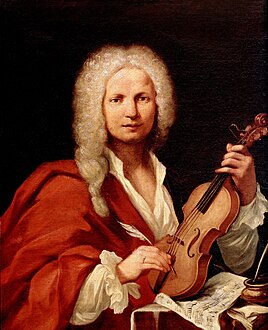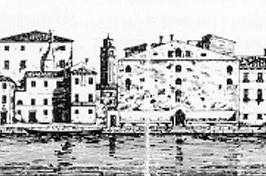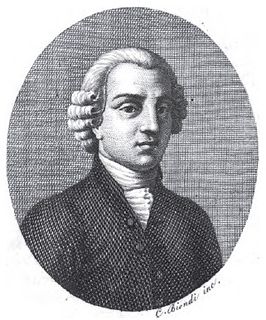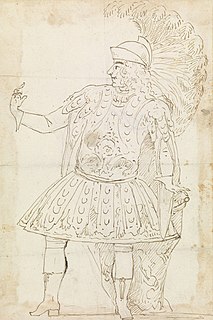
Antonio Lucio Vivaldi was an Italian Baroque composer, virtuoso violinist, teacher, impresario, and Roman Catholic priest.

Benedetto Giacomo Marcello was an Italian composer, writer, advocate, magistrate, and teacher.
The city of Venice in Italy has played an important role in the development of the music of Italy. The Venetian state—i.e. the medieval Maritime Republic of Venice—was often popularly called the "Republic of Music", and an anonymous Frenchman of the 17th century is said to have remarked that "In every home, someone is playing a musical instrument or singing. There is music everywhere."

Il teatro alla moda is a satirical pamphlet in which its author, the Venetian composer Benedetto Marcello (1686–1739), vents his critical opinions on the milieu of the Italian opera seria in the first decades of the eighteenth century. It was first published anonymously in Venice, by the end of 1720. Virtually every aspect of opera seria and its social environment is mercilessly criticized by Marcello: the artificiality of plots, the stereotyped format of music, the extravagant scenography and machinery, the inability and venality of composers and poets, the vanity and vulgarity of singers, the avidity of impresarios, the ineptitude of musicians.

Tito Manlio is an opera in three acts by Antonio Vivaldi, to a libretto by Matteo Noris. It was written in celebration of the marriage of Philip of Hesse-Darmstadt (1671–1736), the governor of Mantua, which he had announced at Christmas. Vivaldi quickly composed the opera within five days. Whereas the wedding eventually did not take place at all, the opera was successfully premiered at the Teatro Arciducale ‘detto il Comico’ in Mantua during the carnival season of 1719.

Nerone fatto Cesare is a lost dramma per musica by Antonio Vivaldi.

Arsilda, regina di Ponto is a dramma per musica by Antonio Vivaldi. The opera was first performed at the Teatro Sant'Angelo in Venice on 27 or 28 October 1716.

L'incoronazione di Dario is a dramma per musica by Antonio Vivaldi with an Italian libretto by Adriano Morselli. The opera was first performed at the Teatro Sant'Angelo in Venice on 23 January 1717.

La costanza trionfante degl'amori e degl'odii is a dramma per musica by Antonio Vivaldi. The Italian libretto was by A Marchi.

Angelo Maria Amorevoli was a leading Italian tenor in Baroque opera.

Giuseppe Maria Orlandini was an Italian baroque composer particularly known for his more than 40 operas and intermezzos. Highly regarded by music historians of his day like Francesco Saverio Quadrio, Jean-Benjamin de La Borde and Charles Burney, Orlandini, along with Vivaldi, is considered one of the major creators of the new style of opera that dominated the second decade of the 18th century.

Sara Mingardo is an Italian classical contralto who has had an active international career in concerts and operas since the 1980s. Her complete recording of Anna in Hector Berlioz's Les Troyens won a Gramophone Award and both the Grammy Award for Best Opera Recording and the Grammy Award for Best Classical Album in 2002. Some of the other roles she has performed on stage or on disc include Andronico in Tamerlano, Mistress Quickly in Falstaff, Rosina in The Barber of Seville, and the title roles in Carmen, Giulio Cesare, Riccardo Primo, and Rinaldo. She has also recorded several Vivaldi cantatas, Bach cantatas, and such concert works as Mozart's Requiem, Rossini's Stabat Mater, and Vivaldi's Gloria among others.

The Teatro San Angelo or Teatro Sant' Angelo was once a theatre in Venice which ran from 1677 until 1803.
Anna Girò, also known as l'Annina del Prete Rosso, la Nina del Prete Rosso, or l'Annina della Pietà, was the stage name of Anna Maria(?) Maddalena Tessieri, an Italian mezzo-soprano/contralto of the 18th century. She is best remembered for her numerous collaborations with composer Antonio Vivaldi who wrote operatic roles for her. She is the singer who performed the greatest number of Vivaldi's operas, the one who kept them in her repertoire the longest time and who made them known across the largest geographical area.

Luca Antonio Predieri was an Italian composer and violinist. A member of a prominent family of musicians, Predieri was born in Bologna and was active there from 1704. In 1737 he moved to Vienna, eventually becoming Kapellmeister to the imperial Habsburg court in 1741, a post he held for ten years. In 1765 he returned to his native city where he died two years later at the age of 78. A prolific opera composer, he was also known for his sacred music and oratorios. Although his operas were largely forgotten by the end of his own lifetime and most of their scores lost, individual arias as well some of his sacred music are still performed and recorded.

Sebastiano Biancardi, known by the pseudonym Domenico Lalli, was an Italian poet and librettist. Amongst the many libretti he produced, largely for the opera houses of Venice, were those for Vivaldi's Ottone in villa and Alessandro Scarlatti's Tigrane. A member of the Accademia degli Arcadi, he also wrote under his arcadian name "Ortanio". Lalli was born and raised in Naples as the adopted son of Fulvio Caracciolo but fled the city after being implicated in a bank fraud. After two years wandering about Italy in the company of Emanuele d'Astorga, he settled in Venice in 1710 and worked as the "house poet" of the Grimani family's theatres for the rest of his career. In addition to his stage works, Lalli published several volumes of poetry and a collection of biographies of the kings of Naples. He died in Venice at the age of 62.

Maria Caterina Negri was an Italian contralto who created numerous roles in 18th-century operas, including many by George Frideric Handel. She primarily portrayed male characters en travesti or female warriors such as Bradamante. Negri was born in Bologna and made her debut there at the age of 15. Her last known performance was in 1744. The date and place of her death are unknown. In its prime, her voice was known for its agility and wide vocal range.
Rosa Borosini [née d'Ambreville] was an Italian soprano and the wife of tenor Francesco Borosini. In 1716 she created the role of Getilde in the world premiere of Antonio Vivaldi's La costanza trionfante degl'amori e de gl'odii.

Diana Vico was an 18th-century Italian contralto who had an active performance career in Europe from 1707 through 1732. Performing primarily in operas, she sang in opera houses in Italy, Germany, and England. She specialized in portraying male characters on stage, and appeared in the world premieres of operas by prominent composers of the Baroque period, including works by Antonio Vivaldi and George Frideric Handel among others.











